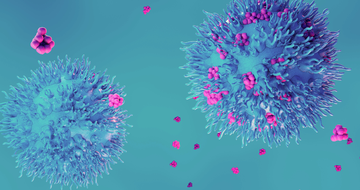- Corresponding FDA announcement: Approval of fixed dose combination of niraparib and abiraterone acetate
What is the potential role for Niraparib and abiraterone acetate in the treatment of prostate cancer?
Niraparib and abiraterone acetate was approved based on the results of the MAGNITUDE trial3
- Phase 3 trial of niraparib and abiraterone acetate as first line therapy in patients with metastatic castration resistant prostate cancer (mCRPC) with and without homologous recombination repair (HRR) gene alterations.3
- Patients were prospectively screened for HRR gene alterations (ATM, BRCA1, BRCA2, BRIP1, CDK12, CHEK2, FANCA, HDACA, or PALB2).
- 423 patients with at least one HRR alteration were enrolled and randomized to abiraterone acetate plus prednisone in combination with niraparib (n = 212) or placebo (n = 211). 3
- The median age was 69 years, 23% had prior abiraterone acetate, 21% had visceral metastases, and 53% had BRCA1/2 mutations.3
- This trial demonstrated a statistically significant improvement in radiographic progression-free survival (rPFS) for niraparib and abiraterone acetate and prednisone compared to placebo and abiraterone acetate plus prednisone in BRCA mutated (BRCAm) patients, with a median rPFS of 16.6 months vs 10.9 months (hazard ratio [HR] 0.53; 95% CI 0.36-0.79; p=0.001)3
- This trial demonstrated that rPFS was significantly longer in the HRR positive cohort treated with niraparib and abiraterone acetate compared to placebo.3
- While a statistically significant improvement in rPFS was seen in the overall Cohort 1 intention to treat (ITT) HRR population (HR 0.73; 95% CI 0.56-0.96; p=0.0217), in the subgroup of 198 (47%) patients with no-BRCA HRR mutations, the rPFS hazard ratio was 0.99 (95% CI 0.67-1.44) and the OS hazard ratio was 1.13 (95% CI 0.77-1.65), indicating that the improvement in the ITT HRR gene-mutated population was primarily attributed to the results seen in the subgroup of patients with BRCAm. 1,3
- Additionally, niraparib and abiraterone acetate combined with prednisone prolonged time to progression, however data is still maturing in regards to the doubling time.3
- In a second interim analysis of the MAGNITUDE trial, niraparib and abiraterone acetate significantly prolonged rPFS. The median rPFS was 19.5 months in the niraparib and abiraterone acetate group compared to 10.9 months in the placebo group plus abiraterone acetate and prednisone (HR 0.55; 95% CI 0.39-0.78; p=0.0007), which was consistent with the prespecified interim analysis.4
What role can the pharmacist play in the management of patients on Akeega ™
Pharmacists can play a critical role as part of monitoring to ensure patients on niraparib and abiraterone acetate are receiving proper dosing, adequate supportive care for side effects, and regular intervals of lab monitoring.
- The recommended starting dose is Niraparib 200 mg and 1,000 mg of abiraterone acetate once daily in combination with prednisone.2
- When prednisone is used in combination with niraparib and abiraterone acetate the recommended dose is 5 mg twice daily. 2
- The dosage forms that are available include 50 mg niraparib / 500 mg abiraterone acetate and 100 mg niraparib / 500 mg abiraterone acetate
- Niraparib and abiraterone acetate is hepatically cleared and thus requires hepatic dosage adjustments for hepatoxicity during treatment.2
- ALT and / or AST > 5 times ULN or total bilirubin > 3 times ULN in the absence of biliary obstruction or other causes:2
- Withhold niraparib and abiraterone acetate and closely monitor liver function
- When AST and ALT resolve to ≤ 2.5 times ULN and total bilirubin is ≤ 1.5 times ULN, may resume at a reduced dose of niraparib 100 mg / abiraterone acetate 500 mg once daily with serum transaminase monitoring every 2 weeks for 3 months, then monthly thereafter
- Concurrent elevation of ALT > 3 times ULN and total bilirubin > 2 times ULN in the absence of biliary obstruction or other causes:2
- Permanently discontinue niraparib / abiraterone acetate
- ALT or AST ≥ 20 times ULN at any time2
- Permanently discontinue niraparib / abiraterone acetate
- Recurrent hepatoxicity at a dose of niraparib 100 mg/abiraterone acetate 500 mg:2
- Permanently discontinue niraparib /abiraterone acetate
- Dosage modifications exist for the niraparib component of Akeega™ based on hematologic and non-hematologic toxicities.2
Drug Interactions2
- Niraparib is a minor substrate of BCRP/ABCG2 and P-glycoprotein/ABCM1.
- Abiraterone is a major substrate of CYP3A4, so it is recommended to avoid strong CYP3A4 inhibitors and inducers if possible while patients receive abiraterone therapy.
- Abiraterone is also a weak inhibitor of CYP2C8 and a moderate inhibitor of CYP2D6.
Clinical Pearls2
- Niraparib and abiraterone acetate should only be initiated in patients who have controlled hypertension and corrected hypokalemia.
- Niraparib and abiraterone acetate have an additive risk of hypertension.
- Administer on an empty stomach, at least 1 hour before and 2 hours after food.
- Niraparib, the PARP inhibitor component of Akeega ™, carries an increased risk of secondary malignancies.
- Due to the increase in the incidence of fractures and a risk for mortality, niraparib/abiraterone (with prednisone) is not recommended for use in combination with Ra-223 dichloride outside of a clinical trial.
- Subsequent treatment with Ra-223 should not be initiated for at least 5 days after the last niraparib / abiraterone acetate (with prednisone) dose.
References
1.US Food and Drug Administration. FDA approves niraparib and abiraterone acetate plus prednisone for BRCA-mutated metastatic castration-resistant prostate cancer. Accessed December 11, 2023. https://www.fda.gov/drugs/resources-information-approved-drugs/fda-approves-niraparib-and-abiraterone-acetate-plus-prednisone-brca-mutated-metastatic-castration.
2.Akeega (niraparib and abiraterone acetate) [prescribing information]. Horsham, PA: Janssen Biotech, Inc; August 2023.
3.Chi KN, Rathkopf D, Smith MR, et al. Niraparib and Abiraterone Acetate for Metastatic Castration-Resistant Prostate Cancer. J Clin Oncol. 2023;41(18):3339-3351.
4.Chi, K.N, Sandhu,S, et al. Niraparib plus abiraterone acetate with prednisone in patients with metastatic castration resistant prostate cancer and homologus recombination repair gene alterations. Ann Oncol. 2023;34(9):772-782.



